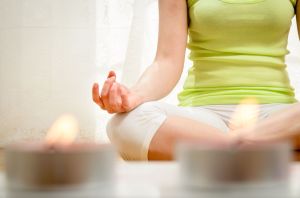
Your mind can do powerful things.
You may think you only use your mind to control the things your body does, but you can actually use your mind to control the things your body feels.
Taking control over your mind can help you decrease negative physical symptoms as well as boost positive feelings.
One way you can use your mind to feel better physically is by practicing gratitude.
How Gratitude Is Tied to Healthier Minds and Bodies
Gratitude is defined as the “readiness to show appreciation for and return kindness.” Director of the Center for Developmental Science at UNC-Chapel Hill, Andrea Hussong, stresses the importance of fostering gratitude in ourselves and in our children.
“Adults who practice gratitude sleep better, have stronger immune systems, lower blood pressure, reduced anxiety and depression, and more satisfied relationships,” she explained.
It’s important to exercise gratitude like a muscle. Strengthening it can take a lot of time and practice, but once you begin to see results you will be — well, grateful!
Austrian Psychologist and Holocaust survivor Viktor Frankl famously said that “Between stimulus and response there is a space. In that space is our power to choose our response. In our response lies our growth and our freedom.” This mentality helped him to survive one of the most traumatic events in human history.
Choosing to devote our attention to the things we are grateful for — family, health, a bed to sleep in — can greatly outweigh the problems that frustrate us. Every event in life presents us with an opportunity to react positively and gratefully, we only need to learn how to make that our default.
17 Gratitude Health Benefits
Being grateful has a variety of health benefits that work on your body as well as your mind and soul.
Researchers have found there are concrete gratitude health benefits. Being grateful doesn’t just feel good in your mind and heart; it actually benefits your body. In addition to providing bodily health benefits, living a life of gratitude also offers benefits for mental health. It can:
- Lower blood pressure
- Strengthen your immune system
- Reduce pain
- Relax the nervous system
- Lower stress
- Reduce depression
- Improve sleep
- Lead to increased rates of exercise
- Lead to increased rates of self care
- Reduce depression
- Boost self-esteem
- Increase resilience
- Enhance empathy
- Reduce aggression
- Increase happiness
- Strengthen relationships
- Improve optimism
Being grateful can help you feel better when dealing with tough psychical health issues. It can also help you get through difficult emotional times.
A study published in Behavior Research and Therapy even found that Vietnam Veterans who practiced gratitude had lower rates of post-traumatic stress disorder after war — showing that being grateful helps you proactively protect yourself from future stresses.
Even better, practicing gratitude has a compounding effect. The more grateful you are, the easier it is to continue to be grateful in the future. It’s a practice that gets easier with time and leads to even more benefits.
Such a small practice and change of mindset can lead to improved mind, body, and soul.
So, are you ready to start practicing gratitude?
How to Practice Gratitude
Hopefully, you said yes and are ready to embrace a new mindset of gratitude. And if you are, here are few tips for getting started.
Practicing gratitude looks different for everyone. It could be doing something as simple as taking a few moments to breathe and be grateful for the things around you. Or, it could be as big as hosting a dinner to thank all of the important people in your life.
Find out what works for you by starting with these simple ways to practice gratitude.
Write it down.
One of the easiest ways to regularly practice gratitude is by keeping a gratitude journal. Set a time each day (I recommend at the end of the night when you’re reflecting on your day) and jot down at least three to five things that you are grateful for.
Often times we forget the minor events that occur in a given day, but writing them down in a diary or journal can help us to recall them later. Imagine if we only wrote positive things in that journal — when we came back to it later it would seem that things were going very well for us in the time that we were writing. This is the idea of a gratitude journal.
Throughout or at the end of each day, write down things that you appreciated, or that made you smile. Alternatively, try writing these things on scraps of paper and filling a jar with them throughout the year. Then read them before the start of the new year, and remember all the wonderful things that happened to you.
Keep in mind, your gratitude journal doesn’t need to be a lot of work. Even just jotting down three one-word sentences a night can make a difference in your life.
Stop complaining.
Now, this might be easier said than done. But start to make a conscious effort to pull yourself back when you feel like you’re slipping into complain mode. Holding thoughts about what is bad in your life won’t make you feel any better. But, holding thoughts about what is good in your life can.
“Looking on the bright side” or cognitive restructuring is a process utilized in Cognitive Behavioral Therapy (CBT) where you counteract negative thoughts using positive alternatives. Whenever a frustrating or depressing thought enters our heads, we can create a list of alternative thoughts and realities to replace it and balance ourselves out again.
Much like the gratitude journal, it can sometimes help to write these things down. Create a chart with columns for negative thoughts and alternative positive thoughts, and rows for the dates. When you have a negative thought (especially a recurring one) write it in the negative column, then fill the adjacent column with alternative positive thoughts that are more helpful and encouraging.
Also, avoid negativity coming in from other sources. Negativity is contagious. If you constantly surround yourself with media, movies, and people that promote pessimism and negativity, it’s going to be difficult to remain grateful. Carefully consider what influences are in your life, and look to surround yourself with more positive people and things.
Related: How to Deal with Anxiety: 6 Ways To Calm Your Mind & Body
Help others.
You can see how much you really have when you start giving it to people who have far less than you. Giving back — whether by donating time, money, or resources — can help you see how much you have to be thankful for.
One of the best ways to feel appreciation is to feel appreciated. When we contribute to a cause locally, nationally or globally and we are certain to feel a sense of connectedness and personal value. Seeing the things that other people are grateful for — medicine, a meal, some shelter — is an incredibly effective reminder of how fortunate we really are.
If more people employed this last little bit of advice and worked to spread positivity, the world would seem much more accommodating and friendly. Be the one to take that first step.
And, if someone does something nice for you, tell them you appreciate them. This action comes with a two-fold benefit. You get to feel good about showing someone that you care, and someone else gets to feel good by being appreciated. Test yourself this year and try this kit that comes with 52 note cards so you can send one thank you a day, all year.
Related: 6 of the Best Ways to Support a Loved One Who Is Struggling
Practice mindfulness.
Mindfulness is the practice of checking in on your thoughts, feelings, and emotions and becoming in touch and aware of them. This type of awareness can help you be more grateful as you become better at seeing the good things in front of you. To work on being more mindful, try taking a meditation or yoga class.
Spending even a little bit of time in your day focused on gratitude can make a difference. Not sure where to start? Try out our 7 Subtle Mini Meditations You Can Do Anywhere, Anytime.
Get More Tips for Living with a Healthy Mind, Body and Heart
Gratitude health benefits are real. When you are more mindful and thankful for the things that you have, you will feel better in your mind, body, and soul.
But, practicing gratitude is just one way to change your habits to live a healthier, happier life.
For more tips on how you can take control of your mind and body to feel better, download our free ebook “How to Take Control and Start Living a Life You Love.”
 Download Our Free Ebook
Download Our Free Ebook
Get our FREE ebook “How to Take Control and Start Living a Life You Love.”
The ebook is filled with over 75 small daily adjustments that can drastically improve your mind, body, and attitude.
Enter your name and email for immediate access.

 What Does a Life Coach Do? How Can One Help Me?
What Does a Life Coach Do? How Can One Help Me?